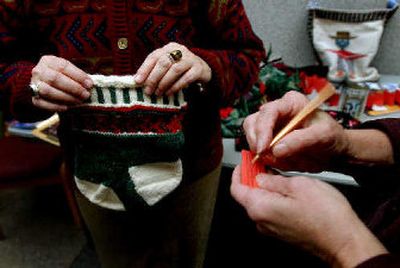NIC instructor knits socks to help hungry families

On the twelfth day of Christmas, Fay Wright fills out her yearly order form: A flock of chicks, a trio of angora rabbits, a hive of honeybees, a heifer, two llamas, a water buffalo or a potbelly pig …whatever is needed most to help hungry families become self-reliant.”
Fay Wright is an English teacher at North Idaho College.
Each year for the past five, she has staged a one-woman campaign on the NIC campus, raffling off her exquisite hand-knit socks or Christmas stockings. The proceeds of the raffle benefit Heifer International, an organization that began in Little Rock, Ark., in 1944, distributing pregnant livestock to poor families worldwide.
Three weeks before finals and Christmas vacation, Fay sets up a table in the Student Union Building, and spends a day knitting, selling raffle tickets, and spreading the word about Heifer through pamphlets and a video presentation.
“I start by taking about 10 minutes out of each of my classes and talking to the students about Heifer,” she says. “I ask them what kinds of volunteer work they’re already doing. At first, most of them just stare at the floor. I see eyes rolling, and that look of ‘Oh, boy – what now…’ But then a few of the faces light up. I see that glimmer in their eyes. A few students will stay after class and talk with me. And maybe a few in each class will follow up on it.”
Fay chooses to support Heifer International because she’s “amazed at its authenticity. I’m a total cynic about most care programs … so much goes to bureaucracy, and gifts that we tend to give are so American in their nature that they don’t meet the needs of the people. A good example was a shipment of Jeeps that were sent to Africa, without gas or any means to get gas for them.
“Students – I’m talking about 18- to 25-year-olds – are cynical, too, because of the world they’ve grown up in,” she says. “They’ve never had an innocent time. They’ve been through one disillusionment after another. But Forbes recently reported that Heifer International was in the top 10 organizations worldwide for the percent of what they take in actually going to programs. There is something out there that is not corrupt, not attached to any particular religious beliefs or part of any government, and that is actually doing something to alleviate world hunger.”
Heifer International was founded 60 years ago by Dan West, an Indiana farmer, after he has spent time as a relief worker in Spain following the Spanish Civil War. Handing out cups of milk to hungry refugees, he had the idea of distributing cows rather than milk, giving the gift of self-reliance.
The pregnant livestock given to families around the globe are a renewable resource. Each gift comes with a caveat: training, skills, or the first female offspring of the gifted animals must be presented to another family in the community, in a solemn ritual called “Passing on the Gift.” Fay adds, “It’s a ‘pay it forward’ sort of concept.”
The recipients of the livestock are able to sell the milk or eggs or wool from their animals. They are taught by Heifer volunteers about inoculations and medications, about herding and general care of the animals, and also how to card, spin, weave and knit, so that they can produce income for their families.
Heifer provides the means, but utilizes local expertise for the training and the building of barns and stables. Fay says, “Heifer doesn’t promote any ideology except that folks learn to feed themselves and their communities. The outgrowth is that communities come together because of the gift giving.”
“It’s practical, all about renewable resources. I donate the raffle proceeds to the general fund because it doesn’t get diverted to other branches, and it’s the livestock program that calls me. It’s tangible,” says Fay. “I’m a very tactile person. A person takes her talent and tries to do something with it. I’ve always wanted to make socks … I LOVE socks! A few years ago, I found a woman who was willing to teach me how to knit them.”
Advertising for the raffle is low-key and personal. Fay visits the various departments at the college. “And then it’s basically word-of-mouth. I hold up my socks. I take pledges. I can always collect.”
Asked how the official winning ticket is chosen, Fay says, “This year, I might throw all the tickets up in the air and let my King Charles spaniel grab one.”
Fay’s raffle sock for 2005 is a chubby green and cream Christmas stocking and is filled, not with chocolate Santas and candy canes, but with hope.